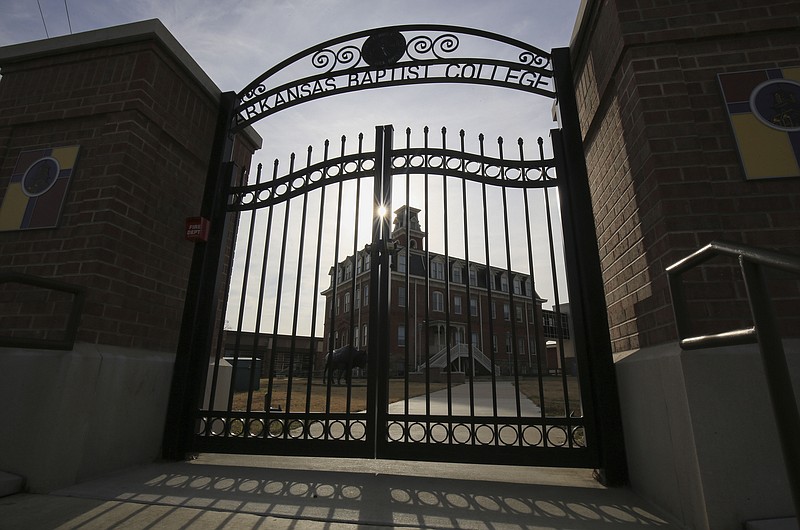Student-loan default rates greater than 30% for borrowers who attended Arkansas Baptist College have put the Little Rock college on a short list of schools threatened with losing their eligibility to disburse federal financial aid like Pell grants.
The private, nonprofit college is a historically Black institution, and one of the oldest postsecondary schools in the state, founded in 1884.
But it's now among 10 schools nationally to have three consecutive yearly cohorts of borrowers default on loans at a rate of 30% or greater, according to a list published Wednesday by the U.S. Department of Education.
The national default rate dropped to 9.7% for all borrowers attending public, private, proprietary or foreign schools, according to data released by the department Wednesday.
Regina Favors, the college's interim president through Wednesday, said in a statement that students remain eligible to receive Pell grants and federal Direct Loan aid.
"Currently, we are preparing to appeal the decision, and we are looking at our Cohort Data for the years 2015, 2016 and 2017 to submit an appeal to the Department of Education for approval to continue participation in these much needed federal aid programs for our students," Favors said.
Last month, the college announced Carlos Clark, its provost and executive vice president, would take over as president beginning today. This fall the college enrolled 445 students, according to preliminary state data.
The measures published Wednesday by the Education Department are an effort by the federal government to hold schools accountable, said Lindsay Ahlman, associate director of research and knowledge management at The Institute for College Access & Success.
The cohort default rate "tracks the share of a college's student loan borrowers who experience the single worst debt outcome -- default -- shortly after leaving school," Ahlman said.
Ahlman said detailed public information isn't always made available, but "often schools that appear on the sanctions list are approved for an appeal that they submit."
The latest 9.7% cohort default rate is calculated for 4,276,724 borrowers who began repayment on certain federal student loans in the 2017 federal fiscal year, which runs from Oct. 1 to Sept. 30.
The rate decreased nationally from the 10.1% default rate for 4,533,276 borrowers beginning repayment in fiscal 2016.
Students are tracked whether they earn a degree or not, Ahlman said, and "students who leave without a degree are much more likely to default."
The graduation rate is 20% for Arkansas Baptist College students, according to the most recent final release data from the National Center for Education Statistics. The college awards associate degrees and bachelor's degrees.
Two years ago, Favors responded to questions from the Democrat-Gazette asking why the college's cohort default rate had increased to greater than 30%. At the time, she cited the college enrolling a large proportion of Pell grant recipients -- federal aid that goes to students with exceptional need -- and also national data showing that Black students made up about 30% of all student-loan defaulters nationally.
In the 2017-18 academic year, 478 out of 593 undergraduates at Arkansas Baptist College received Pell grants, according to the most recent final release data from the National Center for Education Statistics.
Favors in 2018 also told the Democrat-Gazette that the college had begun requiring a one-hour course on financial literacy, and was devoting more resources to student retention and career readiness efforts.
On Wednesday, Favors described the college's response to the rising default rates.
"Arkansas Baptist College was confident that the rate would decrease based on the default prevention strategies that we had in place. We attempted to get as many defaulted borrowers into rehabilitation from the various years as one of our strategies. Reaching the students once they leave the campus is problematic," Favors said.
She said steps taken have resulted in lower default rates so far for 2018 and 2019 student borrower cohorts. The U.S. Department of Education publishes three-year cohort default rates, so data for those years will be published in future years.
Ahlman said "very few" colleges end up with default rates greater than 30% for three years. She said most often it is for-profit schools not offering degrees that find themselves on the list. Five barber colleges were on the list published Wednesday.
"When you have almost a third of your students experiencing the very worst outcomes shortly after leaving your school, there needs to be some consequences. That is an unacceptable level of risk," Ahlman said.
Defaulting on a student loan means a borrower faces added expenses like collection fees, Ahlman said. This also affects a borrower's credit, she added.
"It really can have a spiraling effect on a borrower's life," Ahlman said.
Schools can also potentially lose their eligibility to participate in certain federal aid programs like Pell grants if they have a single year with a cohort default rate above 40%.
The data for Arkansas Baptist College shows that for the fiscal 2017 cohort, 233 out of 639 borrowers had entered default, or 37%. For the fiscal 2016 cohort, 238 out of 668 borrowers entering repayment that year had entered default within three years, or 35.6%. For fiscal 2015, 174 out of 523 borrowers entered default within three years, or 33.2%.
The U.S. Department of Education on Wednesday stated that among historically Black colleges and universities, 90 had rates below regulatory thresholds with only one school subject to sanctions.
If an appeal fails, schools on the list published Wednesday could lose eligibility to participate in certain federal aid programs until Sept. 30, 2022, according to the Education Department's website.
"If Arkansas Baptist College loses eligibility, students who are Pell Grant eligible and/or those receiving federal [Direct] loans will not receive this funding to assist with their costs," Favors said.
